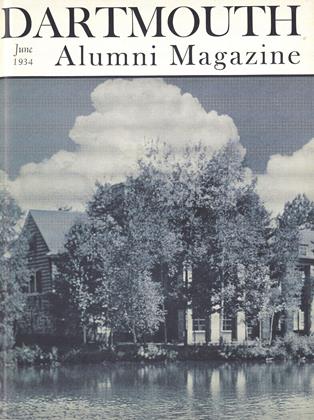By Edwin Richardson Frost '30. G. P. Putnam's Sons. New York. 1934.
The nebular hypothesis (greatly to my personal displeasure) has become bad cosmogony of late; but in so doing it has receded to its true origins in the field of poetic speculation, where it is still useful and apt as a symbol of a poet's evolution, if not of the evolution of solar systems. The mind of a young poet is like nothing more than a brilliant but chaotic swirl of discrete matter—or matters—intensely centralized, and probably shut off from the rest of the cosmos by a gloomy ring of non-luminous dust that makes vision difficult, both from without and from within.
If Edwin Frost's books seems to have set my metaphors in a fine frenzy rolling, the fact may have something to do with the provocative quality of his writing. According to my own perhaps narrow standards, there is hardly a single good poem in D(I6TTIOTI IN the Rockj yet nearly every page flashes with fine single lines, too good of themselves to leave any doubt of the author's potentialities as a poet. Metrical skill without substance is common enough, even among schoolboys; we too frequently meet with the other extreme, with the important subject treated in consistently inept verse; but the phenomenon presented by Edwin Frost's writing is rare, and I do not know quite what to make of it.
The clue to a probable explanation appears on the jacket: "The author began writing before he completed his college career, but it was not until last spring that he tried his hand at verse." It is my impression (gathered while editing material for a national college poetry magazine) that the average student acquires prosodic Skill while obsessed with the old and trite and easy themes that are always new and important to each awakening generation when first they are discovered in actual experience. Later, when a more lively kind of objective problem begins to interest the poet, he has a competent technical equipment ready to hand. Most of his lines are conceived in metrical rightness through conditioned habit. It seems to me that Frost's trouble is a lack of that long, fortuitous process of conditioning. His mind is already dealing with problems that may be unique, but his technic has not yet arisen to a plane comparable with that of his interests. As technic and matter are only two restrictive ways of describing the same thing, the failure of technic also inhibits the theme. That is the best explanation I have to suggest of the mixture of good and bad writing in such a stanza as this: Twice born of tarn opaque stone, Arms right-angled in astonishment; Pellucid phantoms grasping wrists of prone Worshippers whose mystic words atone, Gazing where winged lions have flown,' Chased by admonishment. Deus ex Petra, inspiring the concave crown. Behold, enlightenment!
John Crowe Ransom, probably the most important poet of the New South, has honored this book with an introduction in which he refers to Frost's consistent use of vague mystical symbols, and adds, "Nevertheless I think it not defensible by the critic of poetry, who might insist that it have a plain factual validity whatsoever its esoteric status may choose to be." The objection seems valid; mysticism is an easy escape, too much employed by those who cannot or dare not cope with reality. Any man may write what he pleases to himself. When a mystic wins an audience it is because he has made a mystery comprehensible, or at least alluring. I do not think that Frost has used his mystical symbols in this way; but here again the explanation may merely be an insufficiently schooled technic.
Daemon in the Rock is a rather astonishing book, if a chaotic one. Its defects are of an order that can be remedied only by years of patient exercise of a difficult art, belatedly begun. Nevertheless, I shall be disappointed if Frost does not become an important poet.
 View Full Issue
View Full Issue
More From This Issue
-
 Class Notes
Class NotesClass of 1923
June 1934 By John C. Allen, "Graham Whitelaw" -
 Article
ArticleHANOVER BROWSING
June 1934 By Rees H. Bowen -
 Class Notes
Class NotesClass of 1910
June 1934 By Harold P. Hinman -
 Sports
SportsBaseball
June 1934 By C. E. Widmayer '30 -
 Class Notes
Class NotesClass of 1908
June 1934 By L. W. Griswold -
 Class Notes
Class NotesClass of 1914
June 1934 By Edwrd Leech, Ed Leech
Alexander Laing
Books
-
 Books
BooksFaculty Publications
May 1934 -
 Books
BooksREFLECTIONS ON THE HUMAN VENTURE.
July 1960 By ALBERT H. HASTORF -
 Books
BooksTHE JOURNAL of DA VID GARRICK, DESCRIBING HIS VISIT to FRANCE and ITALY in 1763.
March 1941 By Ernest B.Watson '02. -
 Books
BooksTHE DEMOCRATIC VISTA: A Dialogue on Life and Letters in Contemporary America
JANUARY 1959 By GEORGE F. THERIAULT '33 -
 Books
BooksTHE MOTIVES OF NICHOLAS HOLTZ
March 1936 By H. M. Dargan -
 Books
BooksDEMOCRACY IN THE CONNECTICUT FRONTIER TOWN OF KENT.
October 1961 By HERBERT W. HILL




